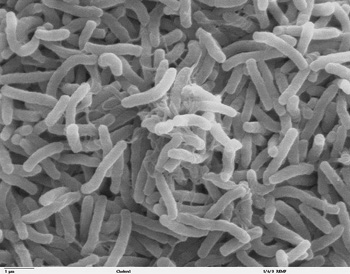What Are Germs?

Cholera bacteria
|
The term “germs” refers to the microscopic bacteria, viruses, fungi, and protozoa that can cause disease.
Unable to live on their own, germs invade our bodies and steal the nutrients and energy that our bodies produce. After gobbling up all of our nutrients and vitamins the germs leave behind their own harmful wastes called toxins. These toxins are the sources of our runny noses, high fevers, diarrhea and hoarse coughs.
Types of germs:
Bacteria are tiny, single-celled organisms that get nutrients from their environments. In some cases, that environment is your child or some other living being. Some bacteria are good for our bodies — they help keep the digestive system in working order and keep harmful bacteria from moving in. Some bacteria are used to produce medicines and vaccines. But bacteria can cause trouble, too, like cavities, urinary tract infections, or strep throat.
Viruses can't survive, grow, and reproduce unless a person or an animal puts up rental space. Viruses can only live for a very short time outside other living cells. For example, germs in infected bodily fluids left on surfaces like a countertop or toilet seat can live there for a short time, but quickly die unless a live host comes along. Once they've moved into someone's body, though, viruses spread easily and can make a person sick. Viruses are responsible for some minor sicknesses like colds, as well as extremely serious diseases like smallpox or HIV/AIDS.
Fungi are multi-celled, plant-like organisms that usually aren't dangerous in a healthy person. Fungi get nutrition from plants, food, and animals in damp, warm environments. Two common fungal infections are athlete's foot and yeast infections. People who have weakened immune systems (from diseases like HIV or cancer) may develop more serious fungal infections.
Protozoa are, like bacteria, one-celled organisms. Protozoa love moisture, so intestinal infections and other diseases they cause are often spread through contaminated water.
What germs do:
Once organisms like bacteria, viruses, fungi, and protozoa invade a body, they get ready to stay for a while. These germs draw all their energy from the host. They may damage or destroy healthy cells. As they use up your nutrients and energy, most will produce waste products, known as toxins.
Some toxins cause the annoying symptoms of common colds or flu-like infections, such as sniffles, sneezing, coughing, and diarrhea. But other toxins can cause high fever, increased heart rate, and even life-threatening illness. If a person isn't feeling well, the doctor may take blood tests, throat cultures, or urine samples to determine which germs (if any) are responsible.
Protecting yourself from germs:
Although germs are everywhere, most of the time we don’t realize that we have germs because they are so small that you need a microscope to see them.
Because most germs are spread through the air in sneezes or coughs or through bodily fluids like sweat, saliva, semen, vaginal fluid, or blood, your best bet is to limit contact with those substances, as far as possible.
How long can germs live outside the body if an infected person sneezes around you? According to Mayo Clinic’s Dr James M Steckelberg, this all depends on where the germ-laden droplets fall. “Experiments with specific cold and flu germs have shown potential survival times ranging from a few minutes to 48 hours or more,” he explains. “Researchers have repeatedly found that cold and flu germs generally remain active longer on stainless steel, plastic and similar hard surfaces than on fabric and other soft surfaces.”
He adds that flu viruses appear to live longer than cold viruses, irrespective of the surface they land on, but both are primarily spread through direct contract with an infected person, like a handshake.
But the easiest way to protect yourself from germs is to wash your hands with soap and water frequently. You should always soap up your hands with suds after using the bathroom, after touching money, or after visiting a sick friend or relative.
|